The issue of the refusal to obey military orders remains one of the most sensitive, toxic subjects in Israel. But with the IDF assault on northern Gaza leading to expulsion of Palestinian civilians and a humanitarian crisis, some Israelis believe that these are war crimes and illegal orders that soldiers are obliged to refuse.
This Tuesday marked the 68th anniversary of the massacre at Kafr Qasem. On October 29, 1956, Israel’s Border Police opened fire on Arab citizens, civilians returning from agricultural work, claiming they were ordered to enforce a new wartime curfew that had been announced while the laborers were away in their fields. When it was over, 50 unarmed civilians were dead.
The massacre was a stain on Israel’s conscience, but Israeli Jews tend to recall that justice was done: a special military tribunal eventually convicted a number of the perpetrators and sentenced them to jail time. Most famously, Justice Benjamin Halevy issued a landmark ruling rejecting the defendants’ arguments that they were following orders to shoot anyone arriving after curfew. Instead, he warned that a soldier who receives a manifestly illegal order, so terrible that a “black flag” flies above it, is not only permitted but obliged to disobey.
This Tuesday, coinciding with the Kafr Qasem anniversary, the Israel Defense Forces attacked Beit Lahia in the north of Gaza, killing over 94, according to Palestinian reports. Over the previous week, Gaza’s Ministry of Health reported that 343 Palestinians were killed in Gaza, before the Beit Lahia attack, and though the ministry doesn’t distinguish combatants, many of the casualties are women and children, according to UN documentation. On Wednesday, U.S. State Department spokesperson Matthew Miller noted that the United States had “not seen sufficient improvement,” in humanitarian aid reaching northern Gaza since the Biden administration warned Israel that the drastic lack of aid could threaten U.S. arms exports to Israel. The situation there is catastrophic, in all areas.
Some Israelis now regard the IDF actions in northern Gaza as a black flag requiring Israeli soldiers to refuse illegal orders.
Tel Aviv University legal scholar Eliav Lieblich wrote on X that if reports that the Netanyahu government was actually intending to transfer the Palestinian civilian population out of northern Gaza for political aims were true, “this is a manifestly illegal order.” Lieblich was referring to the implementation of the so-called Generals’ Plan, which has been widely discussed in the media as the apparent government strategy. This was bolstered by a report by Amit Segal, a top political correspondent for Israeli TV close to the prime minister.
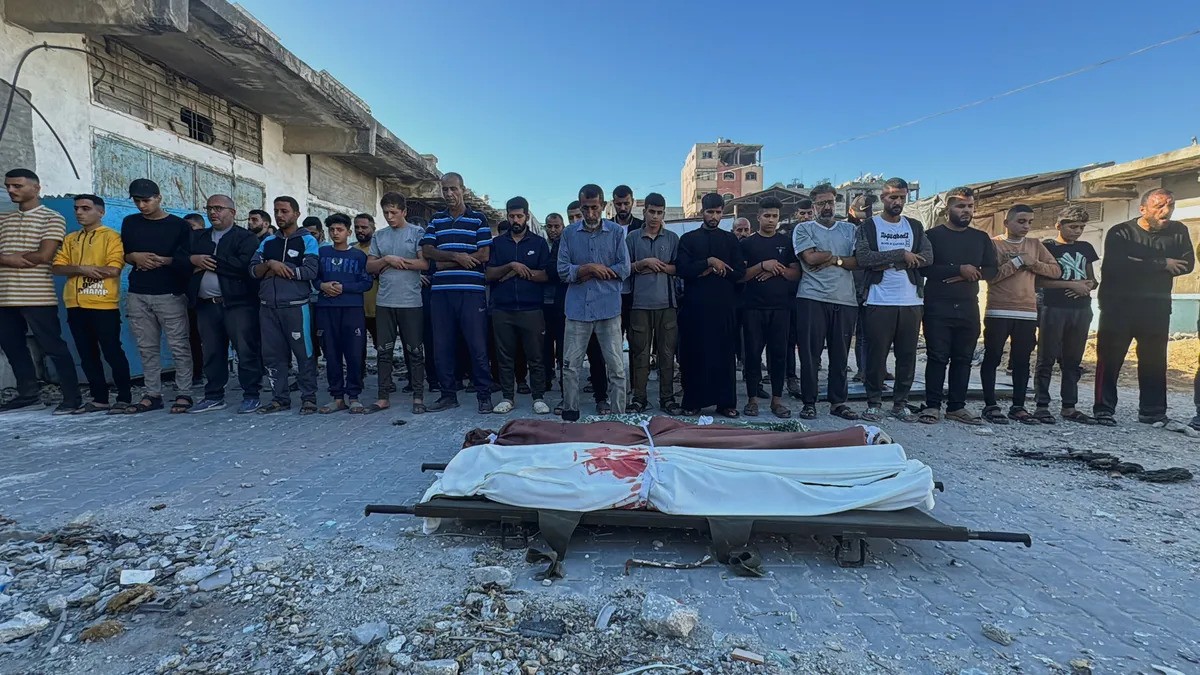
People praying by the bodies of Palestinians killed in Israeli strikes in Beit Lahia on Wednesday.Credit: Stringer/Reuters
Oxford University research fellow and political theorist Shai Agmon elaborated: “If the IDF is expelling Palestinians from the north of the [Gaza] Strip with no intention of allowing them to return, in order to conquer parts of the Strip and change the borders, through starving those who remain – this is a war crime and a manifestly illegal order. According to the instructions of the [Israeli] army, executing such an order is prohibited.” Agmon told me that this instruction appears in the IDF’s code of ethics and is taught regularly in training courses for officers and others.
Tomer Persico, a religious scholar at Jerusalem’s Shalom Hartman Institute, made a similar case in a recent Haaretz opinion article. He quoted decades-old statements of liberal, left-wing politicians of an earlier generation saying: “The day the order for transfer is given, which is a manifestly illegal order, is also the day of refusing the order.”
Debate over whether the apply to word genocide to the war in Gaza rages, but most Israelis still see the word as a signal of Israel-hatred from abroad. But the “manifestly illegal order” is a homegrown concept. It also carries an operative, prescriptive charge: to refuse orders.
‘Don’t do it, period’
Eran Etzion is a former deputy head of Israel’s National Security Council. He served under Giora Eiland, the author of the Generals’ Plan, and knows him well, even respects him, but believes the plan crosses all lines.
On October 22, Etzion wrote: “I have never [before] called for refusal. In my view, this is a step reserved for the most extreme, clearest situations of a ‘black flag.’ A manifestly illegal order. War crimes. And in fact, we’ve reached that point … so if you’re a soldier or an officer, a conscript, careerist or reservist, you are obliged to refuse to take part in any action that is a war crime. And if you’re not serving, it is your duty to call those who are serving to refuse to take part in a war crime.”
That same day, a lawmaker from the Religious Zionism party demanded that Israel’s attorney general open an investigation against Etzion for incitement to evade military service, disobey orders, and/or the publication of sedition. Perhaps the joke is on the complainant, far-right MK Tzvi Succot, who noted in his letter that 83,000 people had viewed the post.
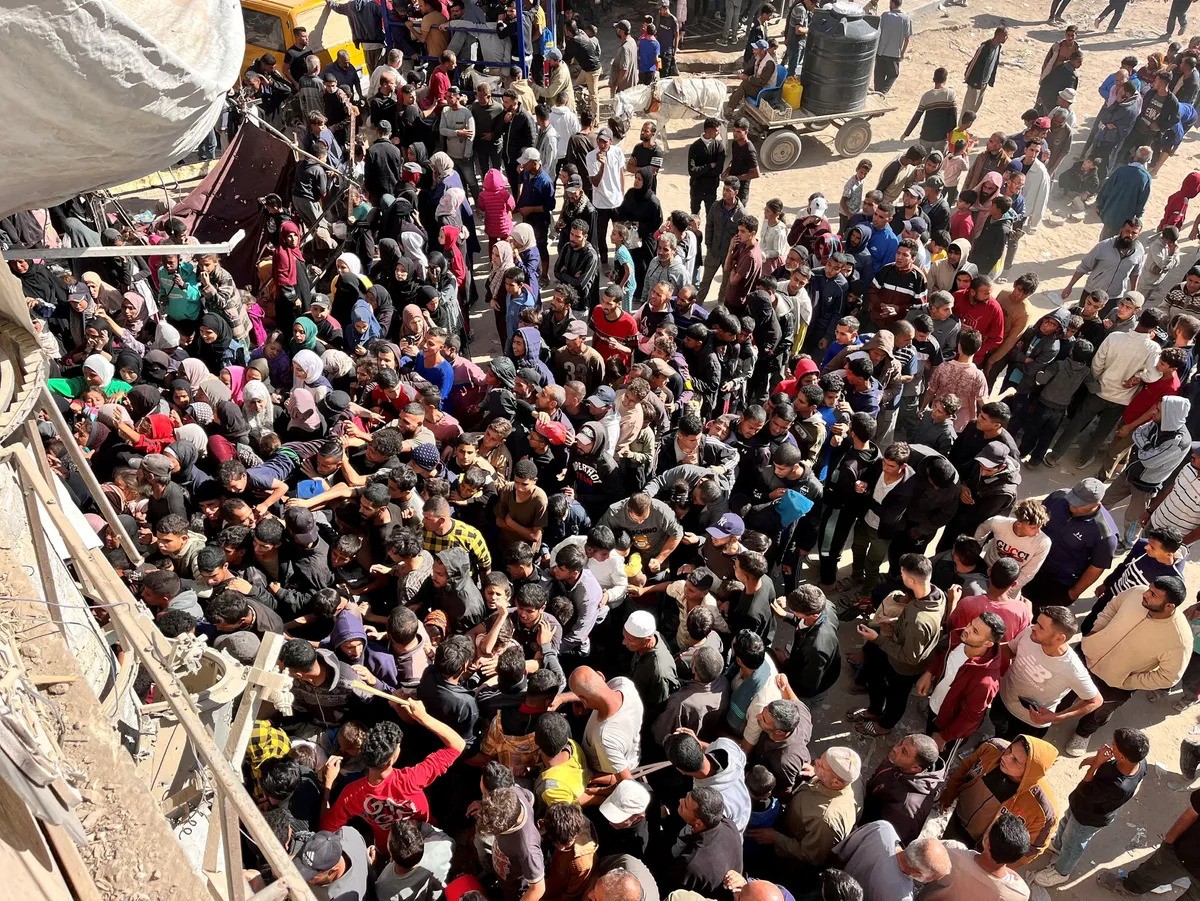
Palestinians gathering to buy bread from a bakery, in Khan Yunis last week.Credit: Hussam Al-Masri/Reuters
Seven days later, Etzion noted that over 820,000 people had seen it. Etzion insists he’s not afraid, and that Succot mainly hoped to scratch out a few “likes” of his own.
But at a time when Israel’s police conducted the bizarre detention of citizens in a synagogue for distributing flyers calling for a hostage release, and arrested an Arab teacher for fictional support of terror, the government’s potential vindictive approach to war critics can’t be ruled out.
Others are more cautious in their prescriptiveness. On Wednesday, Lieblich wrote again that reports of permanent expulsion from northern Gaza, if true, represent a manifestly illegal order. “Each person should carefully weigh his role in this story.”
When asked why he wrote the post, Etzion gave a long sigh and recalled the contradictory statements of Israeli officials – both denials and refusals to deny – that convinced him the Generals’ Plan was underway.
Etzion then reiterated: “I want to say plainly that all [Israeli] soldiers and all officers who are asked to fulfill an order that might be a war crime in the framework of the Generals’ Plan must refuse. … And those like me, an involved observer, must also send the same message. If it could be a war crime – don’t do it, period.”
He is troubled by what he views as a severe deterioration in Israel’s military ethos during the war in Gaza. “When I was a soldier, it was clear to us there were things you don’t do – it was present in our conversations, in both texts and subtexts. … You don’t kill women and children, it goes without saying.”
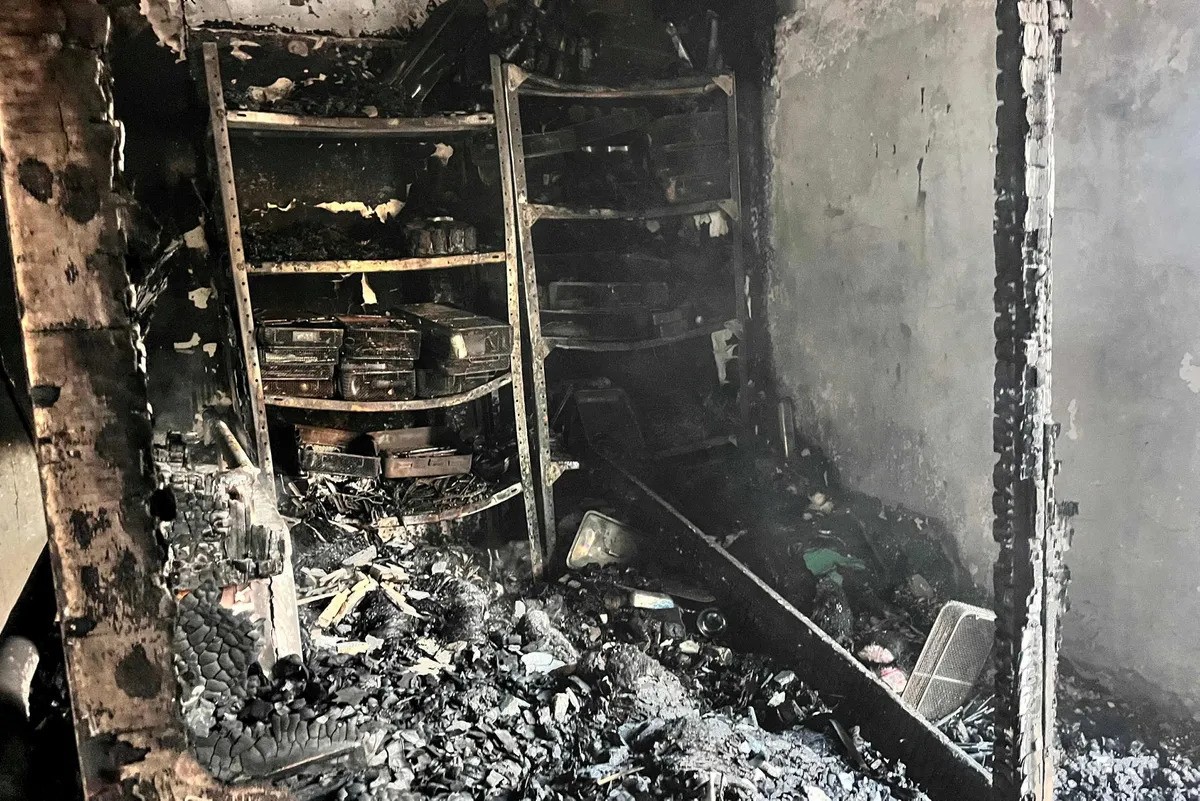
“What’s sad,” he continues, “is that it should be taken for granted. The fact that it’s controversial to tell soldiers not to commit war crimes shows the point we’ve reached.”
Black flag doctrine, or fig leaf?
The issue of the refusal to obey orders remains among the most sensitive, toxic issues in Israel. Many won’t feel comfortable openly advocating refusal. But if the term “manifestly illegal order” is used, it’s a nod to the “black flag” doctrine, and that’s what it means.
But even the accepted image of the “black flag” Kafr Qasem ruling in Israel, which Israeli Jews view with moral pride, may be too forgiving. Adam Raz, a prolific historian who has written a book on the massacre, as well as books on sensitive security issues, believes that the “black flag” doctrine does not have a serious self-limiting impact on Israeli military ethos.
He believes the truth is worse: “Since 1948 to now,” he said, “there is a legal norm that you don’t try military crimes in court, if it happened in an operational context. It doesn’t matter if it’s looting or murder … we don’t have many trials.” Occasional high-profile trials, such as the prosecution of Elor Azaria after he executed an incapacitated Palestinian militant in 2016, are exceptions that obfuscate the more common practice of not trying such crimes.
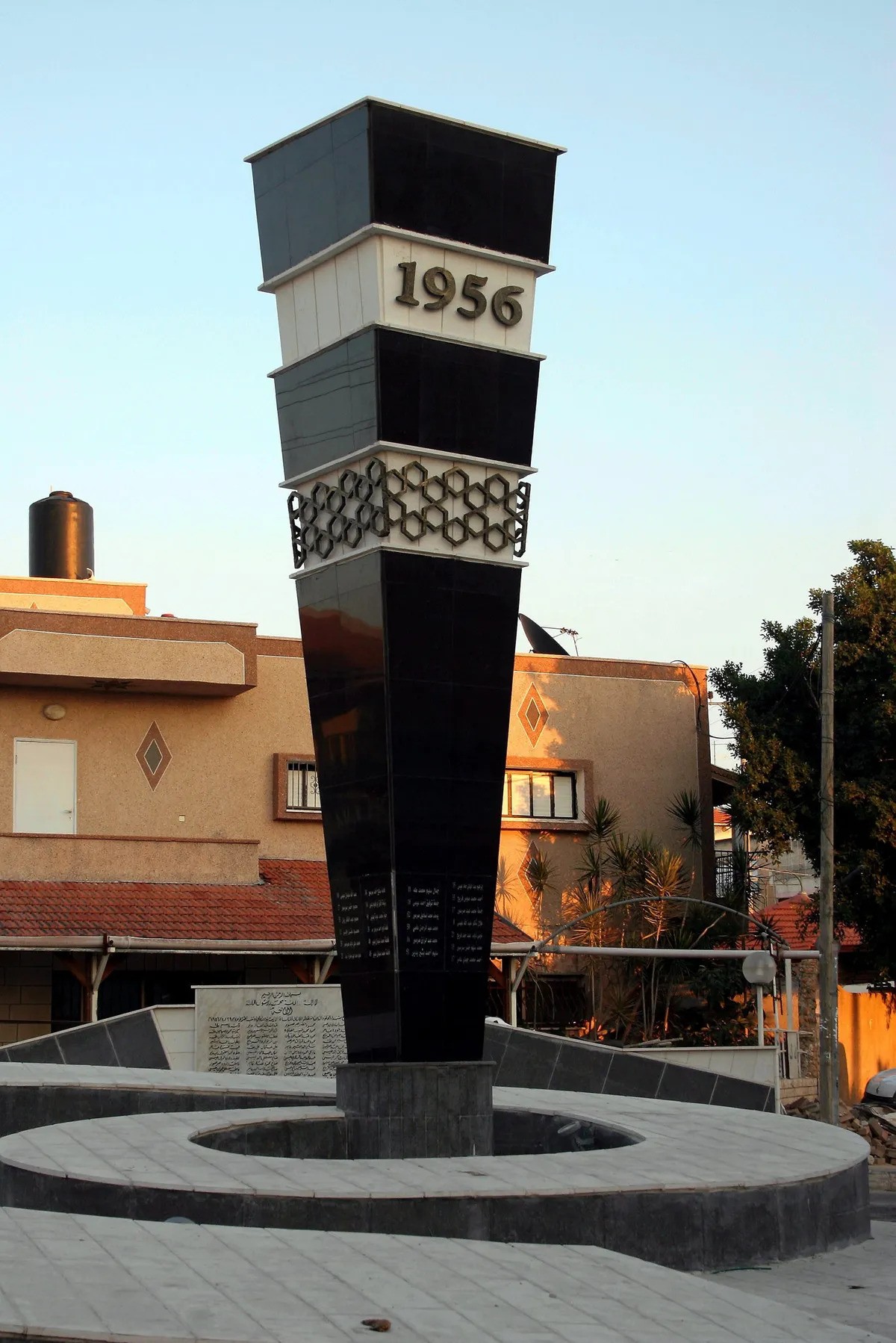
Moreover, Raz said, anyone serving at Sde Teiman – the now-infamous military detention facility where, since the war started, reservists are alleged to have abused Gazan prisoners, or even committed rape – would be too scared to report violence of their fellow soldiers.
Raz believes there are no public sources to say how often soldiers invoke the black flag doctrine to refuse an order. Etzion relates that, anecdotally, he has heard of widespread de facto refusal (mostly via quiet deals between the refusers and their commanding officers) – the non-declarative, nonideological kind: People exhausted after 200 days on active duty, or their businesses on the verge of collapse. Haaretz’s Amos Harel reports concerns within the IDF about low reporting for reserve units too.
Moreover, even the Kafr Qasem tragedy didn’t end with an upstanding moral breakthrough. Those who were jailed for murder had their sentences commuted. When the most senior officer put on trial, Issachar Shadmi, was finally convicted (on a technicality only), he was fined 10 prutot. In his book about the history of the massacre, Raz found a newsletter from the time observing that a glass of soda water cost 30 prutot. He says that today’s soldiers, who film themselves publicly bragging about possible criminal acts in this war, know very well that there will be no consequences.
Still, one of the biggest surprises regarding Etzion was not that a former official who served under four Israeli prime ministers would advocate refusing an illegal order, or war crimes. What was surprising was hearing Etzion relate that the reactions from family, friends, communities on- and offline were mainly supportive.
Most Israelis can’t use the word “genocide.” But some are finding other, more homegrown forms of protesting the moral abyss of the Gaza war.
Source: https://www.haaretz.com
Disclaimer: We at Prepare for Change (PFC) bring you information that is not offered by the mainstream news, and therefore may seem controversial. The opinions, views, statements, and/or information we present are not necessarily promoted, endorsed, espoused, or agreed to by Prepare for Change, its leadership Council, members, those who work with PFC, or those who read its content. However, they are hopefully provocative. Please use discernment! Use logical thinking, your own intuition and your own connection with Source, Spirit and Natural Laws to help you determine what is true and what is not. By sharing information and seeding dialogue, it is our goal to raise consciousness and awareness of higher truths to free us from enslavement of the matrix in this material realm.
 EN
EN FR
FR

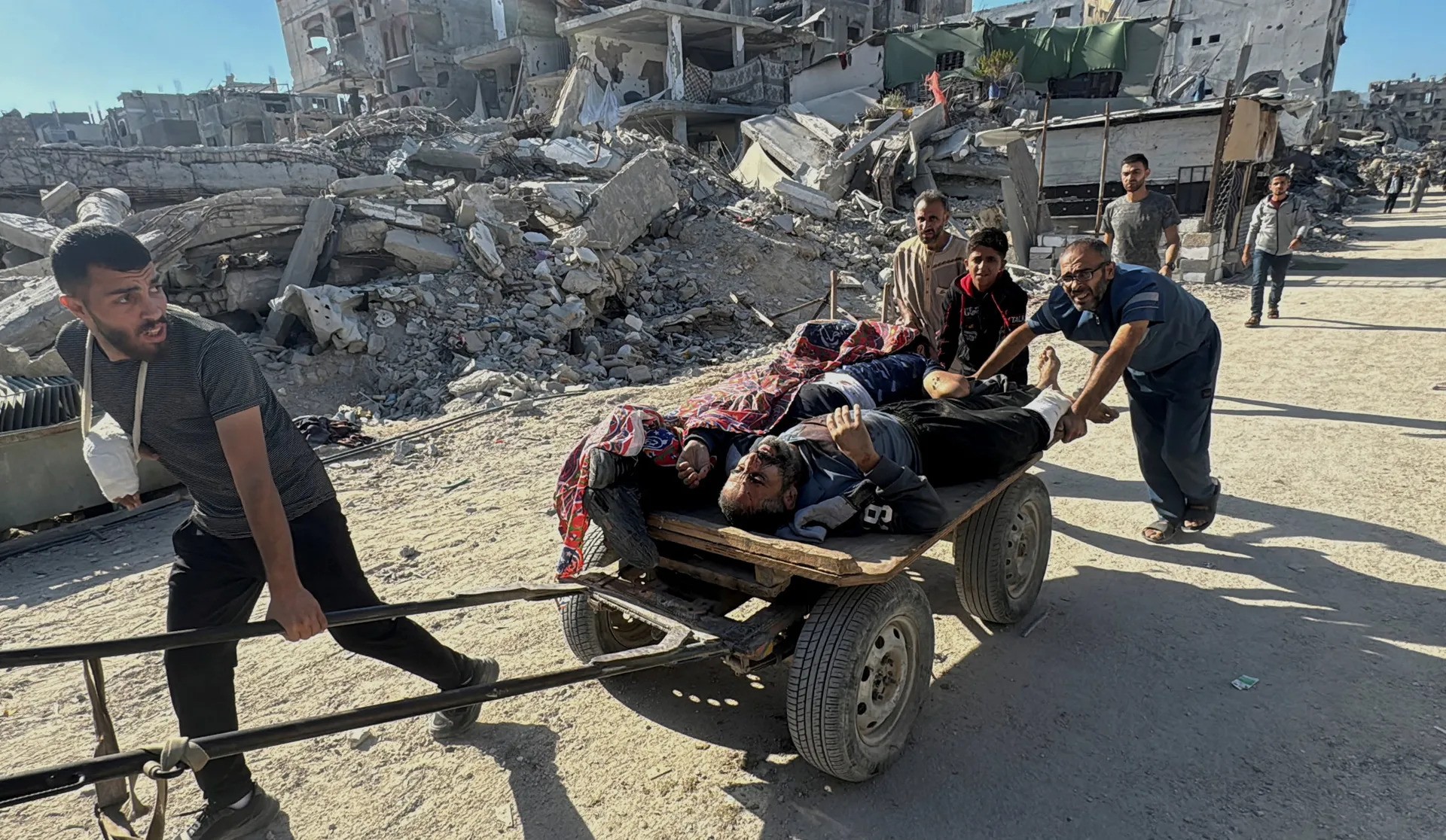












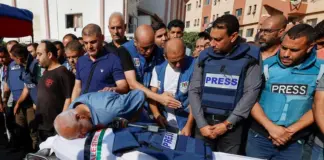












At the Nuremberg Trials after WW2, great #s of German Military Personnel was HANGED, for following orders, by the mostly JEWISH Military Tribunal Judges!
October 19 2024
Breaking News ! – The New Blueprint for Humanity. !
The Antidote for Covid & "ALL" Viruses is " Pure Nicotine on Patches "
Please Share Far & Wide and Save Lives !!!
https://thi-show.com/2024-10-10-thi-show-the-blueprint-show-episode-32/
Vaccine Injury King Trump Digital ID Covid Pass, Opens Door To DNA Test Identifying & Exterminating All Non Jews
https://rumble.com/v5h1kmc-trump-digital-id-covid-pass-open-door-to-dna-test-identifying-the-enemy-ext.html